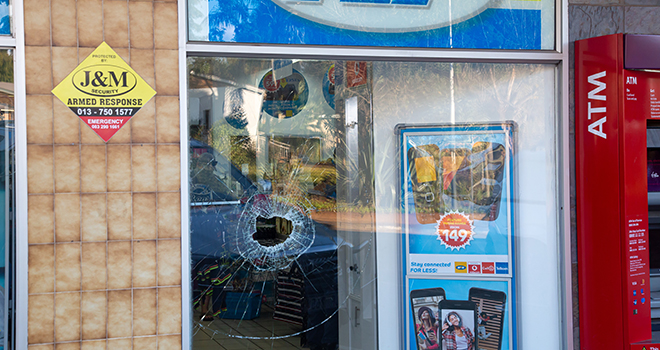With extreme looting hogging the headlines, many people are asking whether losses are covered by their short-term insurance. This will, yet again, be something that we will have to educate the masses on before the prophets of gloom start blame-storming sessions like we reported on last week in the article Are insurers the only bad guys when it comes to Covid-19 BI claims?
Biz24 recently provided some guidance in an article accessible only to subscribers:
“Business owners are reeling from a trail of destruction of property as the looting of shops spread across KwaZulu-Natal and Gauteng on Monday – with large insurance claims expected. But only one insurer – the state-owned South African Special Risks Insurance Association (Sasria) – pays out claims related to political violence.”
An article in Business Maverick expands on this:
“Insurance companies don’t provide cover against such risks, but offer limited insurance for incidents including accidental damages, theft (not arising from riots) and weather-related damages. In practice, business owners would take up normal insurance from short-term insurers, but supplement it with cover from Sasria — effectively signing up for cover with two insurance providers.”
According to this article, Sasria cover is bought through insurance companies, which administer/manage the cover. “When a business incurs a loss or damage as a result of civil unrest, insurance companies will act as mediators and hand over the claim to Sasria. Depending on the Sasria cover, businesses can receive a payout of between R500-million and R1.5-billion. No excess payments are required for Sasria claims.
Cedric Masondo, the MD of state-owned Sasria is quoted as saying “We won’t go to court or spend money on lawyers to decide if your claim is valid or not. We are not going to define what a ‘riot’ means and reject claims if it falls outside of the riot definition. From our point of view, these are all Sasria-related claims and payments can be made within a week.”
Masondo also says that short-term insurers won’t pay for claims if businesses don’t have Sasria cover included in their policies. “Most businesses in townships don’t have Sasria cover. Some don’t have any form of insurance and won’t be able to recover from losses or damages.”
Although some business owners have Sasria cover, the damages to their operations might cost more than the insurer is willing to pay. For example, a standard Sasria insurance policy pays up to R500-million. If a business owner had the standard Sasria policy (with a maximum payout of R500-million) and incurred damages or losses worth R3-billion, Sasria would not pay the outstanding R2.5-billion.
The Business Maverick article quotes Estienne de Klerk, CEO of Growthpoint Properties as saying: “Shopping malls, many of which have been trashed by looters in Gauteng and KZN, are capital intensive and would require a lot of money to fix damages.” She adds that some real estate companies have limited insurance with Sasria, which might force them to pay out of pocket to fix damages. “Generally, that insurance cover is not designed for a province-wide event such as the one we are seeing with the violent riots.”
Sasria cash reserves
According to the article, Sasria, unlike other state-owned entities, is profitable. It recorded a profit after tax of R333-million in 2020 and is self-funded and relies on its balance sheet and not taxpayer-funded bailouts for survival.
Masondo said Sasria has more than sufficient cash reserves — accumulated from premiums collected in previous years and income generated from its investments — to honour claims.
For the 12 months to 31 March 2020, Sasria had cash on hand amounting to R4.25-billion, which has since reduced to R2-billion as the company has to fund its operations. Sasria also had investments worth R8.5-billion (valuation as of 31 March 2020) in listed shares, money market instruments and bonds.
Sasria’s board is not yet prepared to liquidate some of its investments to free up cash to fund insurance claims. “Liquidating some of our investments would depend on how long this looting situation lasts and the number of claims we receive. Our view is that at this stage, we have enough cash in our balance sheet to settle claims.”
“The direct cost of damages or losses incurred by businesses will be easy to determine as time passes. But the indirect cost — for instance, businesses that will not open their doors again or those that won’t be able to generate an income as restart efforts begin — will be hard to audit. The indirect cost will have a chilling effect on joblessness, future investments and the broader economy.”





At least most of the business if they have SASRIA will be covered, unfornately most middle or small CBD businesses or shop. Don’t have such
You are right, Tebogo. What concerns me is that, like with business interruption cover, many people thought it would never happen to them, and now it did.
IT seems like SASRIA is the one government department that the Gupta’s didn’t loot! Let’s hope they are able to pay out the losses so that the companies can get operational again and avoid job losses.
Craig, we comment on this in today’s newsletter. We may be faced by yet another SOE who has to bailed out by the state (read taxpayer).
IT seems like SASRIA is the one government department that the Gupta’s didn’t loot! Let’s hope they are able to pay out the losses so that the companies can get operational again and avoid job losses.
Craig, we comment on this in today’s newsletter. We may be faced by yet another SOE who has to bailed out by the state (read taxpayer).